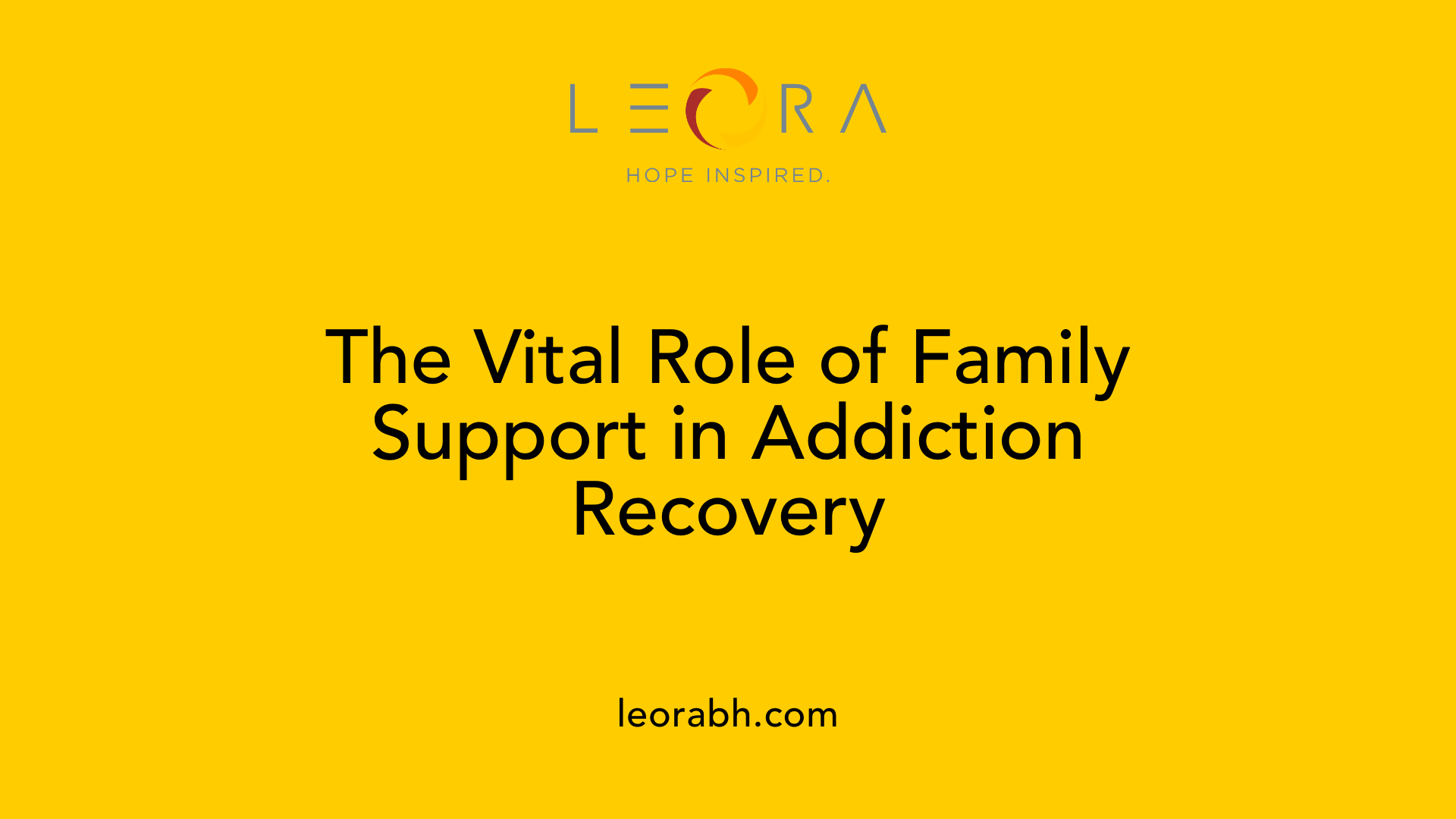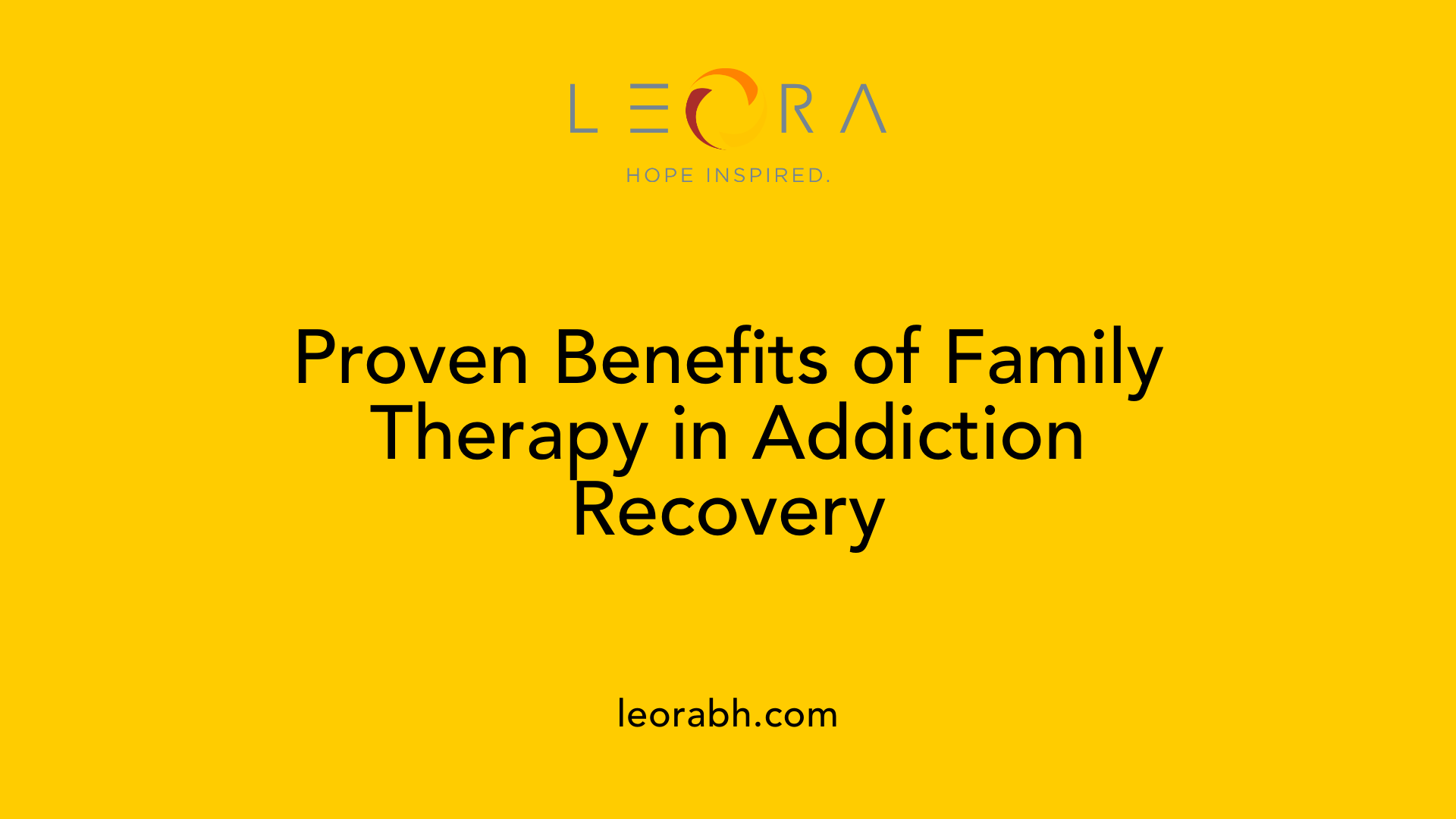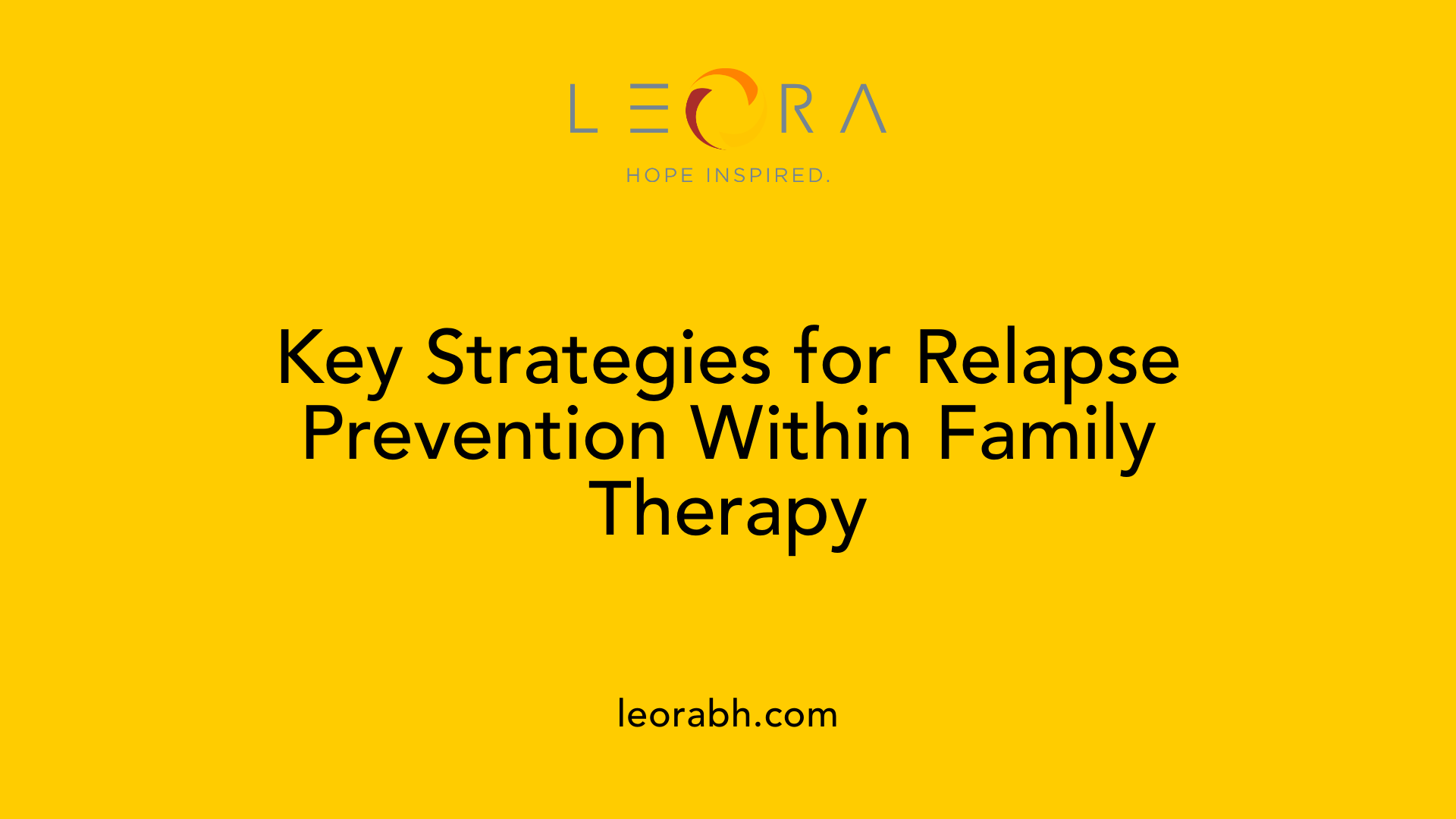The Role of Family Therapy in Addiction Treatment
Exploring the Impact of Family Therapy in Recovery
The Importance of Family in Healing from Addiction
Addiction affects not only the individual suffering from substance use disorder (SUD) but also the family members who navigate its challenges alongside them. The support system that families can provide is critical in fostering successful recovery. By addressing the multifaceted influence of family dynamics on addiction, family therapy emerges as a vital component in addiction treatment. This article delves into the pivotal role family therapy plays, the various approaches used, and its impact on recovery outcomes.
Understanding Family Therapy's Role in Addiction Recovery

What is the role of a family in supporting a loved one in addiction recovery?
The role of a family in supporting a loved one in addiction recovery is vital for successful outcomes. Active engagement of family members in the treatment process helps reduce the isolation and suffering that individuals with substance use disorders experience. Families are integral to the treatment experience, and their involvement during and after treatment has been shown to lead to better long-term prognoses.
Family therapy sessions serve as an educational platform, helping relatives understand the complexities of addiction—framing it as a chronic disease rather than a moral failure. This holistic approach not only provides families with the tools they need to support their loved ones effectively but also aids in addressing and mending strained relationships.
Programs like those at Lifeskills South Florida emphasize psycho-educational presentations and ongoing family therapy to improve dynamics and provide essential support. By addressing family challenges and dynamics, families can play a crucial role in reinforcing the recovery process for their loved ones.
How does family therapy contribute to healing bonds?
Family therapy not only addresses the individual struggling with addiction but also focuses on the family unit as a whole. This approach is crucial for restoring the damaged relationships often affected by substance abuse.
Therapists guide families to engage in open communication, allowing them to express emotions like anger, hurt, and shame constructively. Techniques such as role-playing and storytelling foster empathy and understanding among family members.
Moreover, family therapy helps identify negative cycles and dysfunctional roles within the family (such as the caretaker or scapegoat), aiming to replace these with healthier dynamics. Empowering family members to set boundaries and work on conflict resolution strengthens the support network necessary for recovery, ultimately leading to improved emotional health for all involved parties.
By promoting healing in family bonds, family therapy facilitates a stronger, more supportive environment vital to the success of addiction recovery.
Family Dynamics and Their Impact on Addiction

How does addiction affect family dynamics and relationships?
Addiction has a profound impact on family dynamics and relationships. It creates a ripple effect that can strain interactions and erode the foundation of family trust. Family members often play specific, dysfunctional roles in response to the addiction; these can include the enabler, who protects or supports the addictive behavior, and the scapegoat, who absorbs blame and criticism for family problems. This creates an unhealthy cycle that fosters mistrust, isolation, and emotional distress.
Children are particularly vulnerable, with research indicating that over 10% of children in the U.S. live with a parent who has a substance use disorder. This can lead to the development of their own substance use issues later in life. The emotional toll of addiction often results in broken communication and increased conflict, affecting the mental and physical health of all family members.
Successful recovery hinges on addressing and transforming these dysfunctional dynamics. Family therapy plays a crucial role in this process by facilitating open communication and teaching family members to support each other. This collective involvement is essential for healing, as it helps rebuild trust and improves overall family functioning. Ultimately, understanding the impact of addiction on family dynamics is key to fostering a supportive environment conducive to recovery.
Efficacy of Family Therapy in Substance Use Disorder Treatment

What research supports the efficacy of family therapy in addiction treatment?
Research overwhelmingly supports the efficacy of family therapy in addiction treatment by showing marked improvements in recovery outcomes. Studies have found that integrating family therapy helps address not just the individual struggling with substance use, but also the complex dynamics within the family that can contribute to addiction.
A systematic review of studies conducted since 2010 highlights that family-based treatments yield better engagement rates and success outcomes compared to more traditional, individual-focused methods. Specifically, families engaged in treatment have shown reductions in substance use and significant improvements in family functioning overall.
Highlights of benefits for family-based treatments
Family therapy harnesses the emotional strengths of the family, fostering an environment of support that is critical for recovery. The benefits include:
| Benefit | Description |
|---|---|
| Improved communication skills | Family therapy teaches members effective communication, which aids in resolving conflicts and rebuilding trust. |
| Strengthened relationships | It fosters connection, helping family members feel less isolated and more supported during recovery. |
| Enhanced treatment engagement | Involving family members throughout treatment phases promotes accountability and encourages sustained recovery efforts. |
| Lowered relapse rates | Supportive family dynamics correlate with long-term abstinence, significantly reducing the risk of relapse. |
Ultimately, family therapy not only supports the individual in recovery but also rejuvenates familial bonds, proving to be an effective strategy for treating substance use disorders.
Types and Approaches of Family Therapy in Addiction

What types of family therapy are used in treating substance use disorders?
A variety of family therapy models are employed to address substance use disorders (SUDs), each effectively tackling different aspects of addiction and its impact on family dynamics. Some key approaches include:
Behavioral Couples Therapy (BCT): This model focuses specifically on the relationship between partners, encouraging positive interactions and supportive communication to foster recovery.
Functional Family Therapy (FFT): FFT aims to enhance familial communication and reduce negativity within family interactions, thus motivating change and promoting healthier relationships.
Multidimensional Family Therapy (MDFT): This comprehensive approach integrates individual and family-based strategies emphasizing the interconnected roles of family members in the recovery process.
Community Reinforcement and Family Training (CRAFT): CRAFT encourages family members to support substance users in a non-coercive way, motivating them to seek help while improving overall family dynamics.
Risk Reduction through Family Therapy (RRFT): Addressing trauma-related issues within families, RRFT aims to nurture a supportive environment that aids in the recovery process.
Approaches to healing family relationships
Healing family relationships affected by addiction requires understanding and transformative approaches, including:
- Relational Reframing: Shifts perceptions of family members’ actions from blame to understanding underlying concerns, such as anxiety or fear related to addiction.
- Conflict Resolution Training: Family therapy teaches constructive ways to manage disagreements, reducing tension and promoting healing.
- Communication Skills Development: Therapy sessions often incorporate role-play or storytelling to foster empathy and build stronger connections.
- Setting Boundaries: This helps family members protect their own well-being while encouraging responsible behavior from those struggling with addiction.
These methods collectively empower families, allowing them to rebuild trust, strengthen their relationships, and create a supportive environment conducive to recovery, demonstrating the vital role of family therapy in addiction treatment.
Strategies for Preventing Relapse Through Family Therapy

What strategies in family therapy aid in relapse prevention?
Family therapy employs various effective strategies for relapse prevention in individuals facing Substance Use Disorder (SUD). One of the primary methods involves enhancing communication within the family. Better communication skills enable family members to express concerns and support one another more effectively during recovery.
Another key strategy is fostering social support among family members. Research indicates that stronger support networks significantly contribute to an individual’s self-esteem and resilience, which are critical for maintaining sobriety. When family members actively engage in the recovery process, they collectively reinforce healthy behaviors and attitudes.
Additionally, family therapy addresses specific triggers that may lead to substance use. By identifying these triggers, family members can implement strategies to minimize exposure and devise coping mechanisms more effectively. It also facilitates the rebuilding of strained relationships, enhancing emotional stability, which helps family members recognize and react to early signs of potential relapse.
Overall, the involvement of family members in treatment creates a more recovery-oriented family environment, significantly reducing the likelihood of relapse and promoting sustained long-term sobriety.
Building resilience and support
Family therapy plays a crucial role in teaching families how to navigate the emotional challenges associated with addiction. Through open discussions, family members can share their feelings of anger, shame, and hurt, facilitating healing and understanding.
Therapeutic interventions also focus on instilling resilience within the family unit. Families learn to develop and maintain healthier dynamics, allowing them to adapt positively to changes during recovery. Importantly, family therapy emphasizes skills such as conflict resolution and boundary-setting, which are vital for creating a supportive atmosphere conducive to recovery.
By equipping families with coping strategies and enhancing their engagement in the recovery journey, family therapy not only supports the individual in treatment but also promotes a healthier environment for the entire family, fostering sustainable recovery.
The Importance of Family Involvement in Treatment
Why is family involvement important in substance abuse treatment?
Family involvement is crucial in substance abuse treatment because it helps motivate patients to engage in the recovery process. Educating families about treatment programs and involving them in counseling sessions fosters healthy communication and reinforces the family's support system. This participation can facilitate adjustments to the changes that come with treatment, leading to positive behavioral changes.
Moreover, family support significantly correlates with higher completion rates in treatment programs. It enhances resilience, particularly in adolescents, which reduces the risk of developing substance use disorders.
Impact on recovery outcomes
Research indicates that when family members are actively involved in recovery, individuals are more likely to stay in treatment and achieve long-term sobriety. Family therapy improves communication skills, allows family members to express their emotions, and addresses feelings of anger and shame, leading to a healthier family dynamic.
Furthermore, family therapy can help to identify enabling behaviors and set constructive boundaries. This nurtures an environment conducive to healing and decreases the likelihood of relapse. Families that understand addiction as a disease can offer more effective support, reducing stigma and blame.
In conclusion, a collaborative approach involving family members not only aids the individual's recovery but significantly enhances overall family health. This therapeutic partnership is vital for establishing a robust support network that is crucial for successful recovery.
Cultural and Economic Considerations in Family Therapy
Adapting family therapy to cultural contexts
Cultural considerations play a critical role in the effectiveness of family therapy for addiction treatment. Therapists must recognize the unique values, beliefs, and communication patterns that shape each family's identity. This awareness allows for tailored interventions that resonate with the family's cultural context, fostering a more inclusive and supportive environment.
Moreover, utilizing culturally relevant practices can enhance trust and engagement during therapy sessions, encouraging open dialogue and a more profound understanding of underlying issues rooted in family dynamics. It is important to incorporate family traditions and practices into therapy, which can help in reinforcing healing through culturally significant frameworks.
Economic benefits of family therapy
Family therapy not only supports emotional healing but can also lead to significant economic advantages. Evidence-based family approaches have been found to be more cost-effective compared to traditional non-family-based counseling models. These treatments can potentially reduce the need for more intensive interventions, such as hospitalizations, by encouraging ongoing recovery maintenance within family structures.
Additionally, involving family members in treatment can contribute to better compliance with treatment plans, which may help minimize costs related to substance use disorders and enhance overall family stability, making it a fiscally sensible choice for many families.
Challenges and Future Directions for Family Therapy
Barriers to accessibility of family therapy
Despite the recognized benefits of family therapy in addiction treatment, several barriers hinder its accessibility. Many families face financial constraints that limit their ability to seek professional help. Additionally, a lack of insurance coverage for family therapy often complicates the situation.
Distance and availability of qualified therapists further exacerbate these issues, particularly in rural or underserved areas. Cultural stigma regarding addiction and mental health can also deter families from engaging in therapy, leaving them uncertain about how to seek help.
Future improvements in family therapy integration
To enhance the integration of family therapy into addiction treatment, greater emphasis on training providers in the intricacies of family dynamics is essential. Developing community-based programs that promote education about addiction can also foster engagement.
Furthermore, improving accessibility through teletherapy options can reach more families, especially those hesitant to attend in-person sessions. As the landscape of addiction recovery continues to evolve, innovative approaches that embrace inclusivity and cultural competence will be vital in ensuring that family therapy remains a cornerstone of successful recovery strategies.
Family Therapy: A Pillar of Support in Addiction Recovery
Family therapy provides a critical bridge between individuals recovering from substance use disorders and the supportive networks necessary for long-term sobriety. By addressing both the individual and familial factors at play, it fosters a healing environment where communication and understanding can flourish. As addiction is recognized as a family disease impacting all members, the integration of family therapy into treatment strategies continues to demonstrate its effectiveness. Moving forward, recognizing the unique contexts of each family ensures that therapy remains both culturally sensitive and economically viable, securing its place as an indispensable component in the journey to recovery.
References
- Family Therapy for Substance Use Disorders and Addiction Recovery
- 10 Benefits of Family Therapy for Addiction - My Time Recovery
- [PDF] THE IMPORTANCE OF FAMILY THERAPY Advisory 39
- Family-based Treatments for Adolescent Substance Use - PMC
- Family Therapy for Addiction
- Family Therapy for Addiction Treatment | Drugabuse.com
- The Role of Family Therapy in Recovery - CT Addiction Medicine
- Family Therapy Program for Addiction in Illinois - Gateway Foundation
Find Your Inner Light
Related Articles
Contact Us
Leora Behavioral Health offers a comprehensive addiction treatment programs to help you get your life back on track.
Our trained professionals will work with you to develop a personalized treatment plan that meets your unique needs. If you or someone you know is struggling with addiction, reach out to Leora Behavioral Health today.


.svg)





.svg)
.svg)
.svg)
.svg)